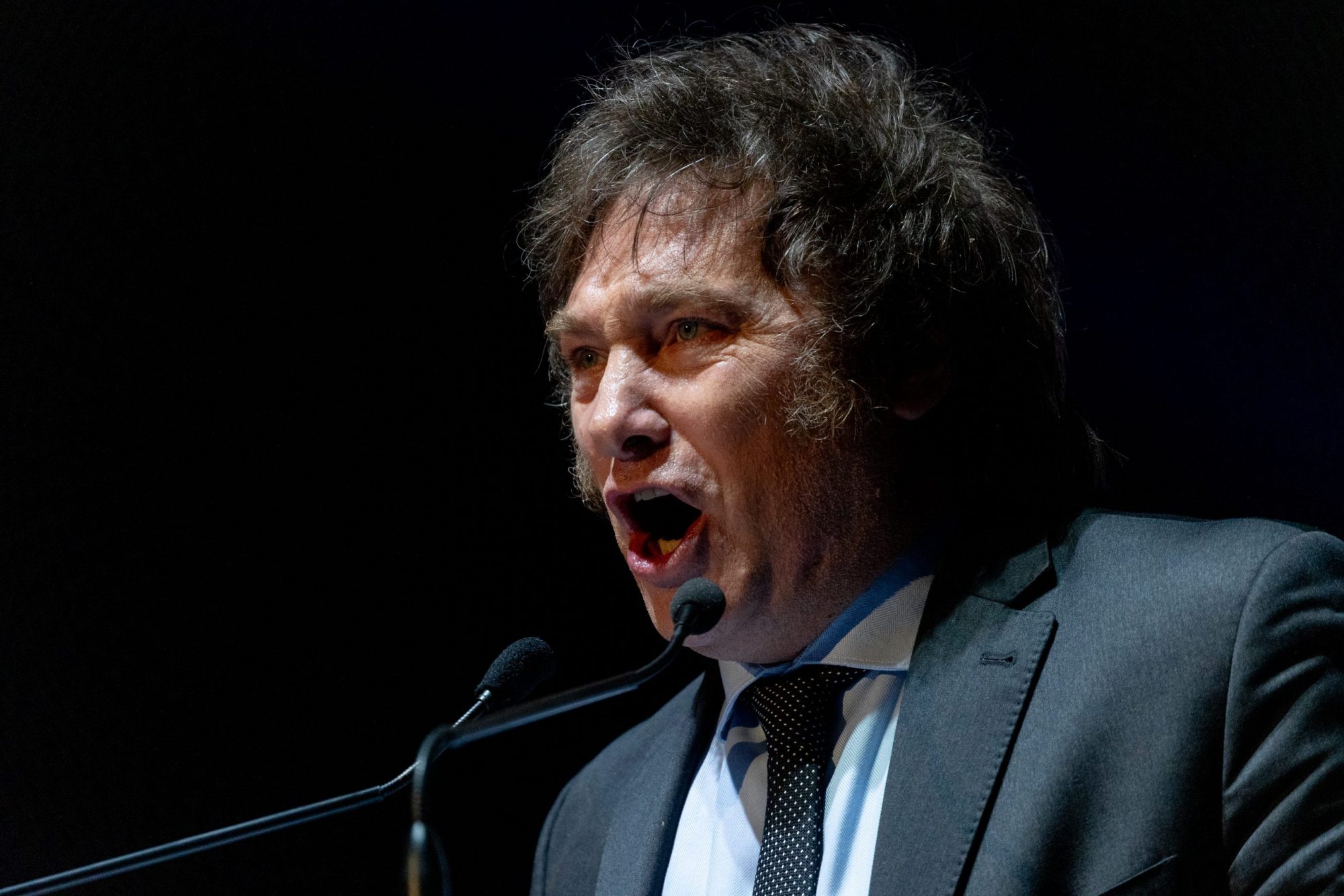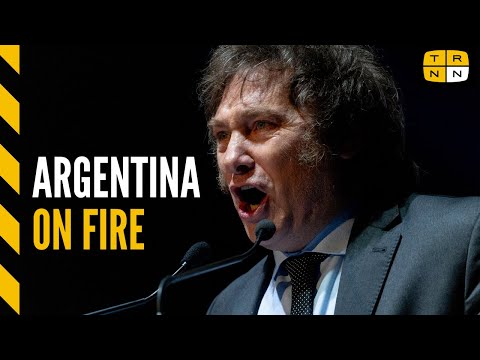The rise of Javier Milei came amid a period of serious crisis for Argentina, which in 2023 led the world in debts to the International Monetary Fund at a whopping $34 billion USD. Vowing to revive the economy and crack down on crime, Milei has unveiled an agenda for austerity, deregulation, and privatization of the economy that is already hitting working class Argentinians hard. After just one month in office, the poverty rate in Milei’s Argentina jumped from 49% in Dec. 2023 to 57% in Jan. 2024. The Real News reports from Buenos Aires shortly following Milei’s election, speaking directly with supporters of the new president and experts on Argentina’s right-wing to understand the factors that contributed to Milei’s election.
This story, with the support of the Bertha Foundation, is part of The Real News Network’s Workers of the World series, telling the stories of workers around the globe.
Producers: Belal Awad, Leo Erhardt, Cinthia Meijide
Videographer: Kevin Perelman
Video Editor: Leo Erhardt
Transcript
Narrator:
The far right has come to power in Argentina. Javier Milei, a self-described “anarcho-capitalist” and bizarre TV personality has received 55% of the vote, catching almost everyone by surprise.
Javier Milei:
When you have some morons trolling from a computer, you know what? While they watch the lady online I’m under her sheets.
Narrator:
With rising poverty and runaway inflation Argentina has voted for a radical change. And Milei’s campaign promises, represented by a chainsaw, are indeed radical: sweeping privatization and ruthless economic cuts.
Protester:
This knife is for Milei, so he can cut all he needs to cut.
Narrator:
His policies range from the extreme right to the simply bizarre, and include shutting down the central bank, dissolving 13 government ministries, replacing the Peso with the US Dollar and even a proposal to introduce “market mechanisms” to organ donations.
Javier Milei:
If they don’t stop overspending, a crisis will happen.
Narrator:
But how did such a wild and radical political message bring Milei to power? We met with Ernesto Bohoslavsky, a political analyst who has been studying the far right in Argentina.
Ernesto Bohoslavsky:
One of the great differences between these extreme right wing figures in Europe and the United States with respect to Latin America is that in general in Europe they are more linked to nationalist perspectives and protection of the internal market.
Le Pen in France, or I think for Trump in the United States. Defending national production against imports.
In Latin America’s case they are linked toideas that favor exactly the opposite. All favor deepening deregulation. Markets as free as possible, and abandon any pretense of an autonomous dimension to economic life.
In the second round, Milei received 55% of the vote. That’s millions of people.
There are many expectations and they contradict, inevitably. A part of his voters just wanted to have a non-Peronist government. They were exhausted after several years. And I think they are satisfied with the results.
Narrator:
Indeed, on the streets people were celebrating the end of the previous government, as much as welcoming the new one. The end of an era symbolized by so-called “Peronism”, a left wing political movement that has been in power for 16 of the last 20 years.
Initiated by Juan Perón, an Argentinian politician in the 1940s, the movement is based on support of labor movements and encourages a robust public sector to manage social issues such as inequality, healthcare and education. A position which Milei and the right wing of the country have viciously attacked.
Chants:
“Argentina without Cristina! Argentina without Cristina!”
Protester:
This is what people are celebrating. The people are tired of the same old governments. Because they know that they have always been corrupt. And what I like the most about Milei and his proposals is to go against the corruption and injustice of the politicians against the people.
Protester:
We are going to go through a time where things will be taken from us we’re going to have to pay for the train, and transportation is going to be more expensive. We are going to be more or less the same. But then we will finally start to feel that money will start to work for us.
Protester:
Seeing that having your own business and building it from scratch without external support is very difficult and that the state is a constant obstacle, so anything that can be done to reduce the size of the state and make it stop being an obstacle to the growth of entrepreneurs motivated me to join this party.
Protester:
You’re going to hear chants against the previous leaders all the time here, because everyone knows they are thieves.
Narrator:
These extreme privatization policies are mixed with an emergency crisis narrative in which taking extreme measures is sold as the only way out.
Ernesto Bohoslavsky:
A few days before the elections a very interesting poll was published asking:
‘Who are you going to vote for?’ And: ‘Which potential President are you afraid of?’
And something interesting is that 12% of Milei’s voters declared to be afraid of Milei’s potential presidency. We are talking about people who have some kind of awareness that the strict application of his policies is going to affect their quality of life.
I believe that some of his voters chose to ignore what was being said in the campaign.
Narrator:
High on the list of problems to solve for Milei’s political base, is the issue of criminality and perceived insecurity, many of his supporters told us that they don’t feel safe.
Protester:
As I am interested in security, it seems to me that one of the insignia of liberalism that should be defended is the civilian right to bear firearms.
Not 100% free, but today it’s 100% for the criminals.
Protester:
What I think needs to be fixed as an emergency – like right now- is public safety. Sadly here, the justice system and politics defend the victimizer not the victim and so, I believe that a strong hand is needed whoever commits it, should pay.
Narrator:
Milei’s supporters look to El Salvador’s “tough on crime” president Nayib Bukele, who since coming to power in 2019 has initiated highly controversial security laws, built huge “mega prisons” and incarcerated tens of thousands of prisoners.
Human Rights Watch has described El Salvador as having “systematically committed grave human rights violations” and even the US State Department has published concerns around “arbitrary killings, torture” and deadly prison conditions.
Protester:
It might sound a bit strong, but… what Bukele did in Salvador with respect to criminalization, I think we should do the same here.
Protester:
If Bukele achieved changing his country and making it what it is today, we can do it too. We simply need a strong hand. A strong hand and principles.
Narrator:
Despite the wave of popular support for Milei and his radical policies, almost immediately cracks have begun to appear. Three days into Milei’s new government the currency devalued by 118%, inflation exploded with no relief in sight. Though people voted for a radical change in the hope of economic stability, what they may have instead is more uncertainty.
On his tenth day in office, Milei signed a mega decree modifying 300 laws to deregulate the economy. Milei stated that if parliament rejects the decree, he will call for a plebiscite.
In response, people are already taking to the streets, even under threat of heavy-handed police repression and with some general strikes already planned, it seems that the working class is mobilizing.




